CSR Materiality
Under the Toyoda Precepts (corporate creed), Toyota Industries has been undertaking a broad range of businesses by upholding the philosophy of contributing to society since its founding. In keeping with recent changes in the business environment, we have clarified which social issues we should tackle as our CSR material issues, and will work for the resolution of these issues. We use part of the evaluation on target achievements for initiatives on key CSR materiality items as a reference index for calculating bonuses for executives.
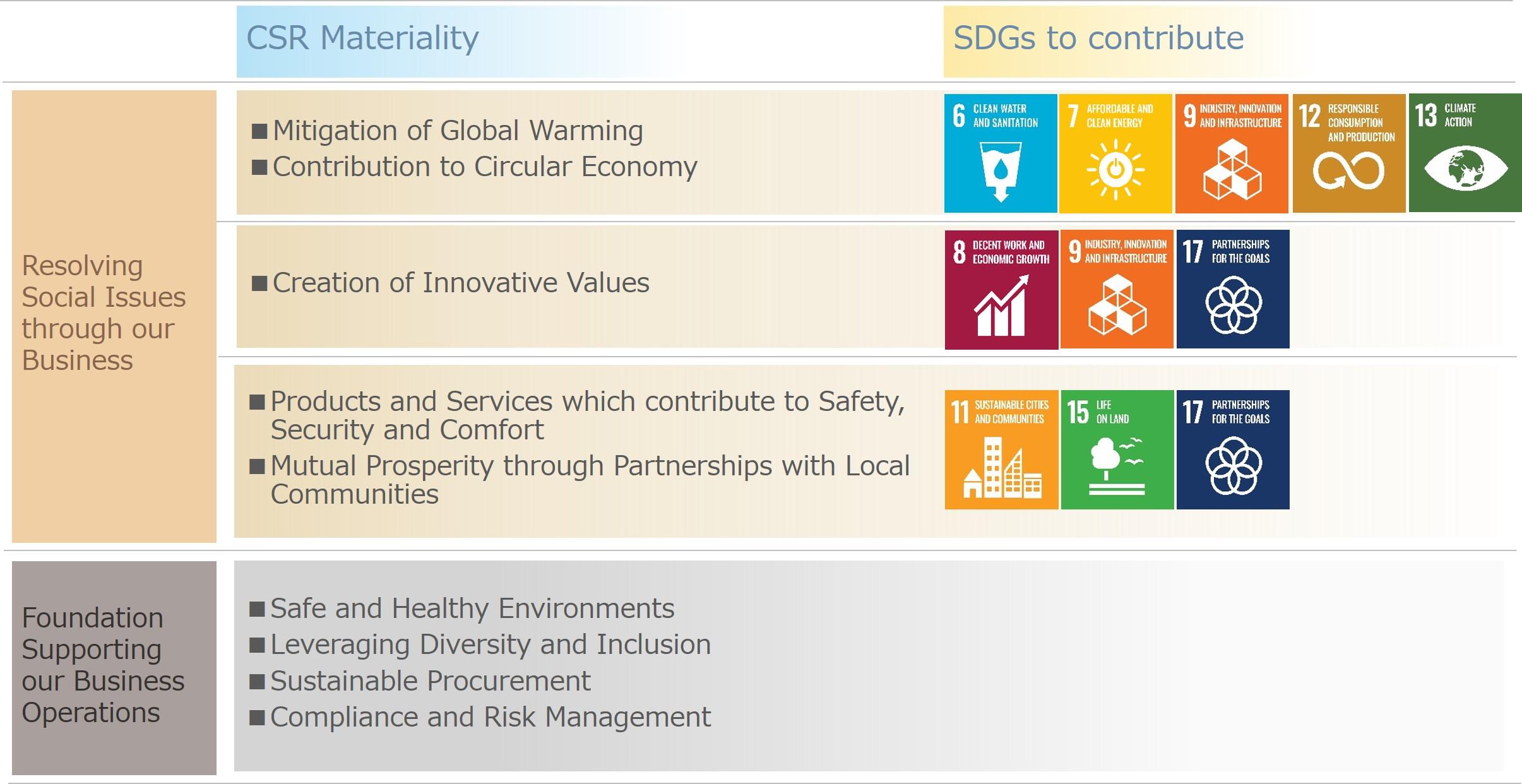
Process to Determine CSR Materiality
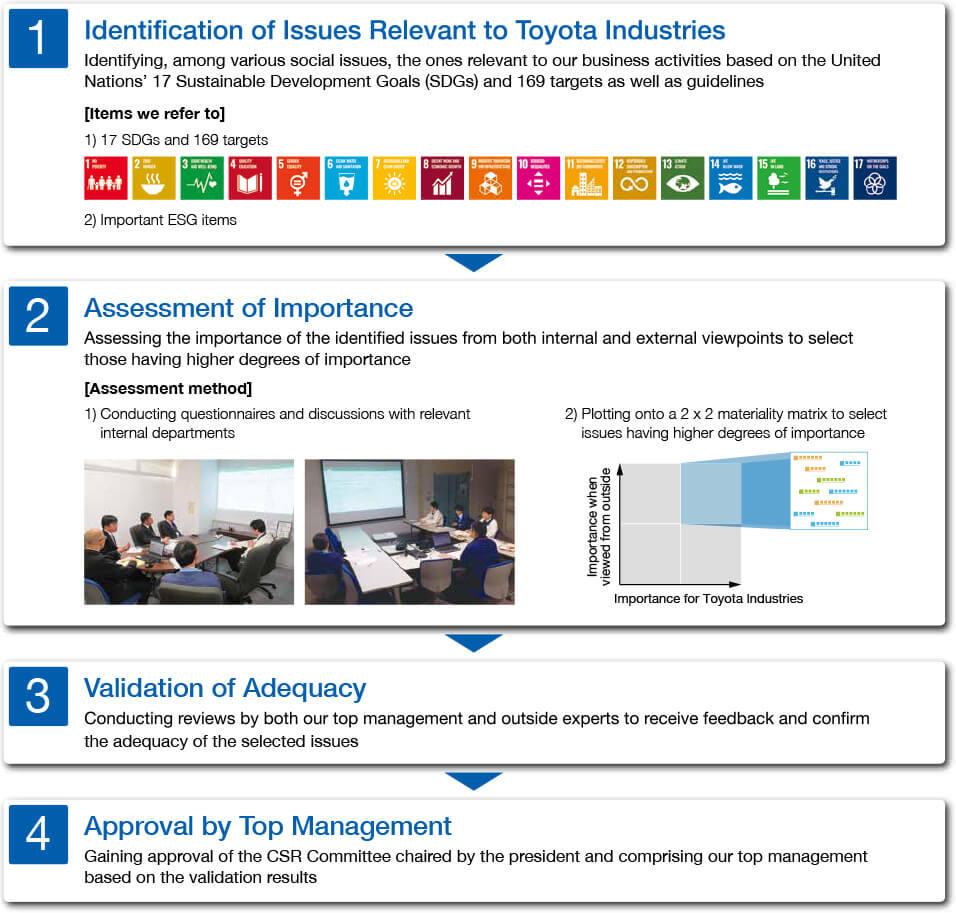
Action Policies, Targets and Results of "Resolving Social Issues through Our Business"
Resolving Social Issues through Our Business

Mitigation of Global Warming
Contribution to Circular Economy
Contribution to Vision 2030 (Aspiration):Clean/zero emissions
Mitigating global warming and achieving a circular economy through such initiatives as reducing CO2 emissions and waste in our business activities and expanding the lineup of environmentally friendly products in our efforts to contribute to maintaining and improving the global environment over the long run
| Action Policies | Action Targets and Activities | Targets for FY 2026 | Results for FY 2023 |
|---|---|---|---|
| Reducing CO2 emissions from production activities | Reduce production-derived CO2 emissions Total emissions | -25% *1 (vs FY14 level) |
-30% (vs FY14 level) |
| Adopt renewable energy sources Introduction rate | 15% | 15% | |
| Reducing CO2 emissions from production-related logistics | Reduce logistics-derived CO2 emissions Emission volume per unit of production (non-consolidated) |
-11% (vs FY14 level) |
-8% (vs FY14 level) |
| Reducing CO2 emissions through product and technology development | Develop technologies that contribute to an even greater level of energy efficiency | - | - |
| Effective resource utilization in production activities | Reduce waste generation volume Emission volume per unit of production (non-consolidated) |
-12% (vs FY14 level) |
-17% (vs FY14 level) |
| Promote water conservation activities corresponding to the water situations in each country and region | - | - | |
| Implementing initiatives to promote 3R(reduce,reuse and recycle) design for effective resource utilization | Reduce use of resources and promote reuse and recycling of resources | - | - |
*1 As a more ambitious target, we are aiming for a 50% reduction by fiscal 2031 from the fiscal 2014 level.
Main Initiatives
Reducing Energy Consumption through Improved Heat Balance
The Higashichita Plant, a foundry part and engine production base in Aichi Prefecture, has implemented a project to reduce its energy consumption with a focus on heating facilities, which were found to consume a large quantity of energy in a survey conducted on production facilities.
The plant has previously undertaken various energy-saving activities because reducing energy used by its industrial furnaces is a challenge facing the plant as a manufacturer of engine parts.
In fiscal 2023, the plant launched an initiative based on the idea that identifying wasteful use of energy while paying attention to a balance between energy input into furnaces and net energy used in manufacturing processes might lead to an effective reduction in energy use.
The plant conducted a survey on an aluminum melting furnace and cast iron heat treatment furnace, two particularly large consumers of energy. It identified the source for considerable energy loss for the aluminum melting furnace to be heat dissipation from the furnace body and the outlet of molten metal. For the cast iron heat treatment furnace, heat dissipation from the furnace body and heating of workpiece trays were found to be the primary causes. Accordingly, the plant adopted measures to counter each problem.
As a measure against the common issue of heat dissipation from the furnace body, the plant attached insulation panels and applied thermal barrier coating to the furnaces and successfully reduced the heat released from their bodies. For the heat dissipating from the molten metal outlet of the aluminum melting furnace, a larger and thicker outlet cover was effective in increasing heat insulation and reducing heat release. As for the heating of workpiece trays of the cast iron heat treatment furnace, the plant modified the tray structure by reducing weight at the same strength and succeeded in reducing the energy used for heating.
These and other comprehensive measures have resulted in an annual reduction of CO2 emissions by about 242 tons.
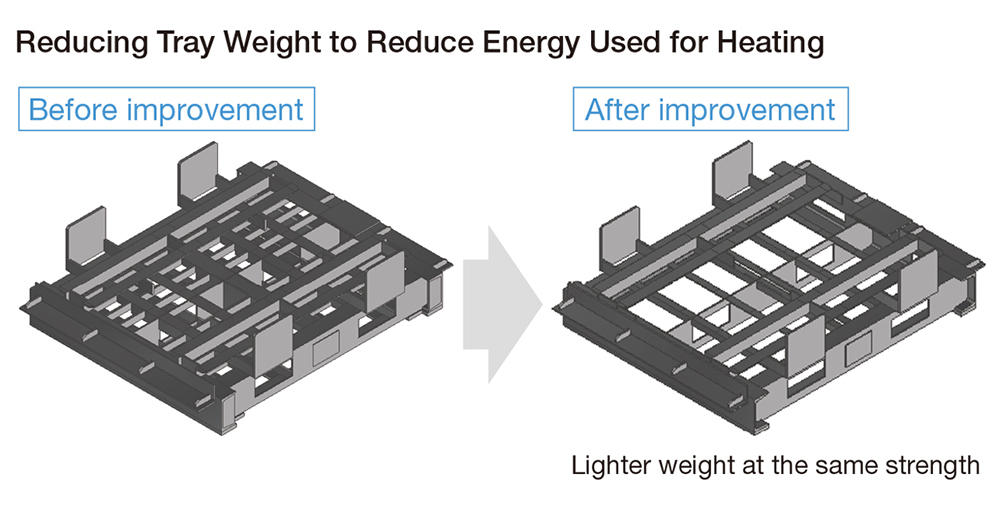
Reducing the Use of Masking Materials by Improving Two-Color Painting Process
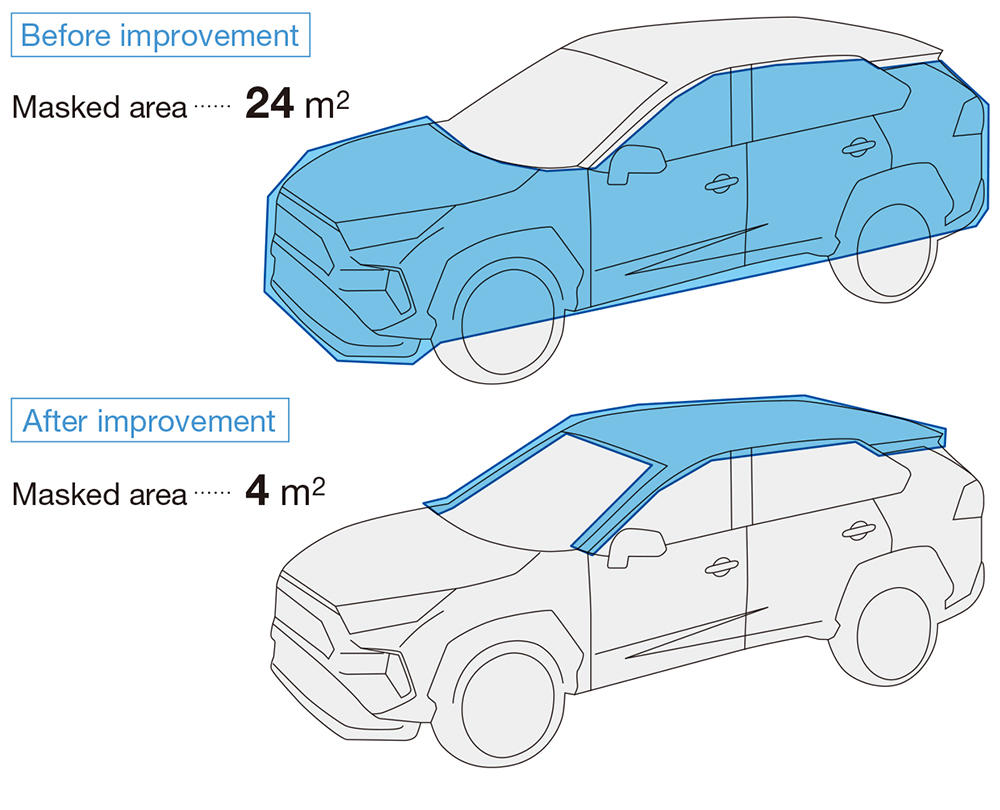
The Nagakusa Plant, a vehicle assembly base in Aichi Prefecture, has been working to reduce its use of resources.
At the plant, painting a two-color body of the RAV4 is done in two steps. The conventional method applied a first color to the lower part of the vehicle, and after masking the painted part, painted the roof with a second color. In this order, large quantities of masking materials were needed to cover the lower part. The plant launched an improvement activity, based on reducing the use of masking materials by first painting and masking the roof, which is smaller than the lower part.
The plant verified the change in the order of paint application to identify any issue and found that the new order will change the orientation of the edge, which represents a level gap between the two painted portions, and cause the paint to peel off as parts interfere with each other when opening and closing the doors. The appearance of the edge itself will also deteriorate. The Design, Quality Assurance, Manufacturing and other departments worked together for a design change and resolved these issues by moving the edge further inward. As a result, the use of masking materials was reduced by 74%.
We will continue to make joint efforts, encompassing design and other upstream departments as well as manufacturing sites, to reduce our consumption of materials.

Creation of Innovative Values
Contribution to Vision 2030 (Aspiration) :Creation of innovative value, smart
Contributing to achieving a “smart” society and more enriched lifestyles by resolving social issues through technological advancement and innovation that create new values
| Action Policies | Action Targets and Activities | Targets for FY 2031 | Results for FY 2023 | Targets for FY 2024 |
|---|---|---|---|---|
| Promoting development of new technologies that create new values | Ratio of R&D expenses for electrification and automation | Over 70% | 54.1% | 58% |
| Improving core technologies and utilizing the new knowledge of business partners to enter into peripheral fields of existing businesses while developing and offering technologies and products in new business fields | Expand peripheral fields and new business fields Net sales | Over ¥1 trillion | - | - |
| -Develop new technologies and products that contribute to resolving environmental and social issues | ||||
| -Develop new technologies and products for logistics automation and expand sales (Materials Handling Equipment) Sales of automation products (growth rate) |
Twofold (100%) (vs FY2021) |
UP50.1% (vs FY2021) |
UP71% (vs FY2021) |
Main Initiatives
Development of an autonomous lift truck
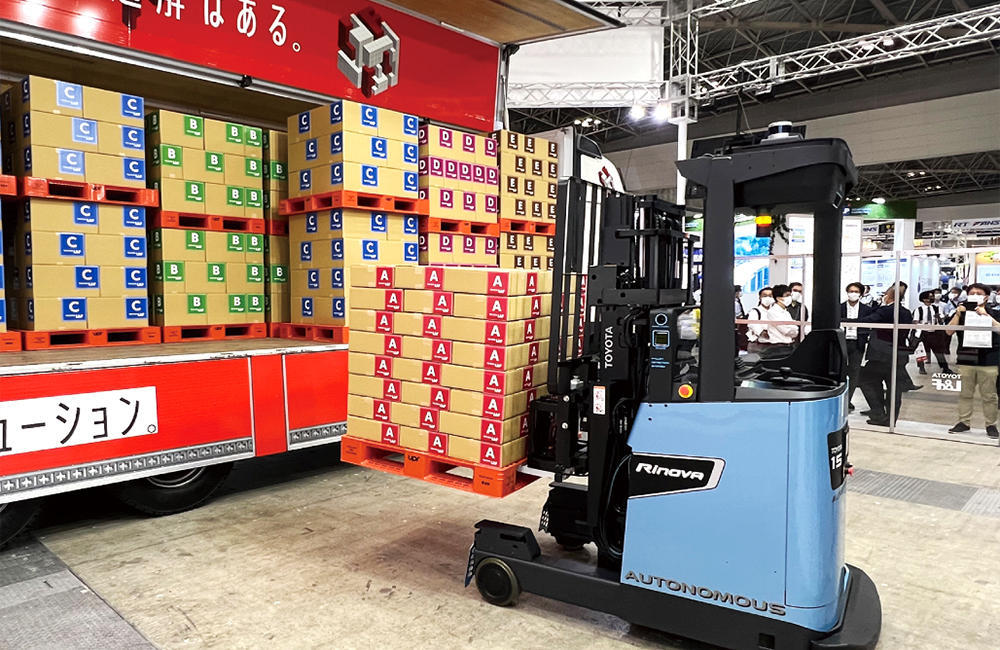
The work style reform-related law that will go into effect in 2024 in Japan is expected to aggravate the shortage of truck drivers. At relay centers mandated to be set up in accordance with the law, there is an urgent need for better efficiency and labor saving in truck loading and unloading operations. Automation of truck loading and unloading operations using lift trucks has lagged even at cutting-edge distribution centers. To counter these issues, we have developed an autonomous lift truck that features the world's first AI-based technology to automatically recognize the location and position of the truck and its cargo and runs autonomously to conduct loading and unloading operations. We exhibited the lift truck at Logis-Tech Tokyo 2022.
In the future, we will repeat feasibility tests in terms of safety, work efficiency and cost and offer the product as an optimal solution for individual logistics sites of many customers, thereby helping them counter the impending labor shortage in 2024.
Launching new fuel cell lift truck
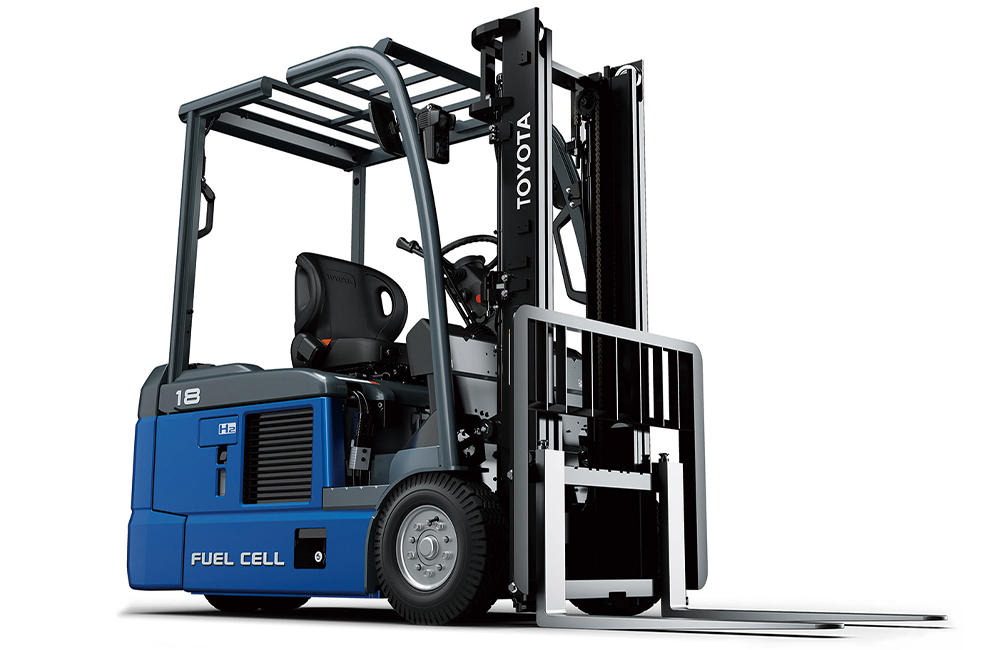
We have launched a new fuel cell lift truck ("FC lift truck") with the first major FC system improvement in six years.
Vehicle price has been reduced by 30% thanks to a significant reduction in the cost of the fuel cell system ("FC system") and durability*2 has been doubled*3 in comparison to the current vehicle.
The FC lift truck is a next-generation eco-lift truck with excellent environmental performance, emitting no CO2 during operation, as well as superb convenience, allowing hydrogen refueling to be completed in only three minutes.
We will continue to contribute to the realization of a carbon neutral and hydrogen-based society from the logistics industry through the development and spread of FC lift truck lineups.
*2:Output performance maintenance period of FC systems (period that the output can be maintained at 80% or more of the performance at the time of shipment)
*3:Based on JIS D6202. According to in-house research

Products and Services Which Contribute to Safety, Reliability and Comfort
Mutual Prosperity through Partnerships with Local Communities
Contribution to Vision 2030 (Aspiration) :Safe/reliable, comfortable
Contributing to creating a compassionate society by offering products and services that anticipate the needs of customers and various stakeholders and that are safe, reliable and comfortable to use while fulfilling our responsibilities as a member of society to thrive together
| Action Policies | Action Targets and Activities | Targets for FY 2031 | Results for FY 2023 | Targets for FY 2024 |
|---|---|---|---|---|
| Expand sales of electrification-related products (all businesses) Ratio of electrification-related products to net sales |
Over 70% | 42.2% | 46% | |
| Enhancing electrification-related products and services that are highly functional, ecologically sound and adaptable as social infrastructure | -Offer highly efficient and energy-saving electric compressors that are excellent in terms of quiet operation and comfort (Automobile Business) -Offer clean and high-quality fuel cell units and on-board batteries (Automobile and Materials Handling Equipment businesses) -Offer power source-related products, on-board or otherwise, that can also be used as social infrastructure during disasters and other occasions (Automobile Business) |
|||
| Offering high-quality and safe products and services and maintaining and improving the structure to realize this goal | Conduct product risk assessment (target products) Implementation rate (non-consolidated) |
100% | 100% | 100% |
| Continuously promoting grassroots activities in local communities and thrive together as a member of Society | Promote quality education Training participation rate (non-consolidated) |
100% | 92.3% | 100% |
| Promote social contribution activities Expenditure/number of participants | - | ¥910 million/ 28,500 persons | - | |
| -Contribute to biodiversity conservation of local communities -Promote other community contribution activities |
||||
Main Initiatives
Expansion from Air Conditioner Parts to Core Components of Electrified Vehicles Driven by Diversifying Needs
With the growth in electrified vehicles, there have been new challenges for BEVs as vehicles, creating a need for electric compressors to diversify. In response, we are rolling out new products tailored to such new needs by utilizing our product development capabilities cultivated to date.
As electrified vehicles need to secure a heat source that substitutes for the exhaust heat of the engine when running a heater, it has become necessary to operate the compressor during the cooling and heating of the vehicle interior. With the addition of heat pump heating, which takes heat from the air, it is now required to extend compressors' uptime and range of use. As such, we are working to improve the reliability of electric compressors and achieve higher efficiency to reduce the impact on vehicle driving range.
To prevent battery performance deterioration and shortened life during high-power operation and quick charging of vehicles, compressors also need to provide a function for cooling the battery in addition to heat-pump air-conditioning. We have developed and released large-capacity electric compressors as a core component of electrified vehicles, thereby satisfying the varying needs of electrified vehicles with our extensive product lineup.
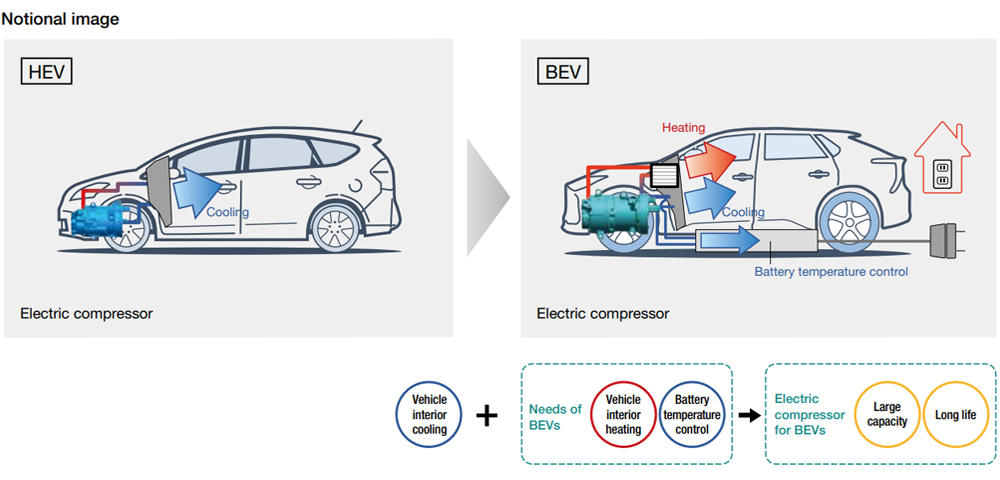
Creation of “Birdpia,” a Paradise for Birds
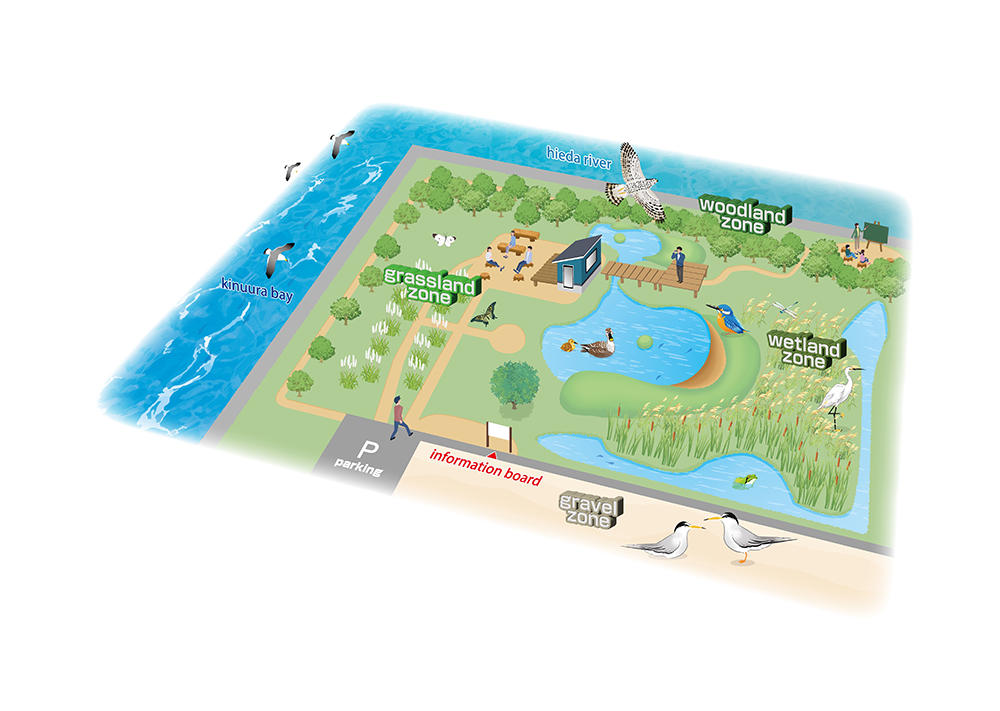
We created “birdpia,” a paradise for birds, within the premises of the Higashichita Plant to attract endangered bird species.
To become a plant operating in harmony with nature, the birdpia in the Higashichita Plant seeks to secure a stable living environment for birds and achieve habitat separation between humans and birds. It is used to expand the habitat for birds and serve as a venue to provide environmental education for employees and their families to learn about biodiversity. The birdpia is divided into four zones, namely grassland, woodland, wetland and gravel zones, to provide a diverse environment. An observation shed and walking paths are also set up to allow people to observe birds and other living things without endangering their habitats.
We have confirmed that the birdpia has been visited by about 50 species of birds and will continue to make efforts to contribute to expanding the ecosystem in Kinuura Bay.
Setting up an Insect Hotel within the Plant Premises
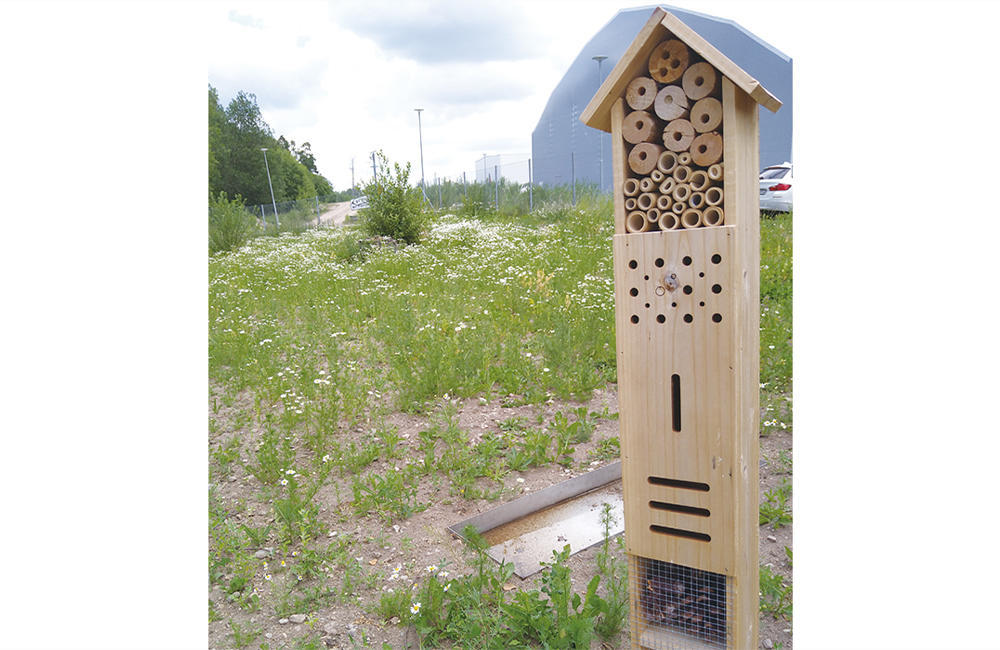
Toyota Material Handling Manufacturing Sweden AB (TMHMS), a subsidiary manufacturing materials handling equipment in Sweden, has created a biodiversity area on the plant premises and set up an insect hotel, a man-made habitat, within the area for insects and microorganisms.
The aim is to create an environment friendly to insects and microorganisms, attract birds and small animals that feed on them and ultimately establish a balanced ecosystem.
Increasing Models Equipped with Our Bipolar Nickel-Metal Hydride Batteries
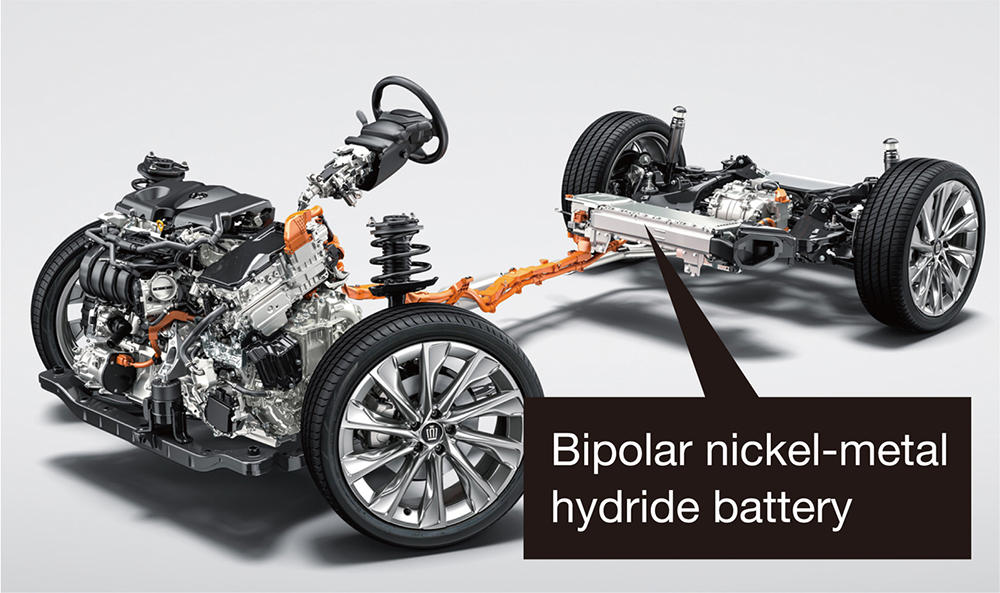
Following the Aqua, the bipolar nickel-metal hydride battery, which achieves both superior driving and environmental performance, has been fitted in the Toyota Crown and Lexus RX in fiscal 2023. Going ahead, we will continue to respond to future increases in demand.
As we proceed with various initiatives toward carbon neutrality, we will contribute to the more widespread popularity of TMC’s electrified vehicles with our bipolar nickel-metal hydride batteries, which can be fitted in a variety of HEVs.
Action Policies, Targets and Results of "Foundation Supporting Our Business Operations"
Foundation Supporting Our Business Operations
Safe and Healthy Work Environments
Leveraging Diversity and Inclusion
Sustainable Procurement
Compliance and Risk Management
| Action Policies | Action Targets and Activities | Targets for FY 2031 | Results for FY 2023 | Targets for FY 2024 |
|---|---|---|---|---|
| Eliminate serious accidents | ||||
| -Number of serious accidents | 0 | 0 | 0 | |
| -Frequency rate of lost workday injuries (non-consolidated) |
0.00 | 0.06 | 0.00 | |
| Fostering safe and healthy workplaces for everyone | Utilize diverse human resources | |||
| -Ratio of female managers (non-consolidated) |
3.6% | 1.7% | - | |
| -Ratio of employees with disabilities (non-consolidated) | Over 2.7% | 2.57% | Over 2.4% | |
| Creating the environment for everyone to get a fair share of opportunities to develop and demonstrate their potential | Maintain sound transactions and strengthen structure throughout the supply chain -Implementation rate of Sustainability checks on target suppliers (non-consolidated) |
100% | 100% (1,140 companies) |
100% |
| Establishing the foundation to remain a company that is trusted and needed by society | Eliminate serious compliance violations Number of violations |
0 | 1 | 0 |
| Promote risk management activities taking a risk-based approach -Improve BCP effectiveness |
||||
| -Respond to cybersecurity risks Number of serious incidents | 0 | 0 | 0 |
Creating a Safe Workplace by Preventing Occurrence and Recurrence of Industrial Accidents
Since the occurrence of a serious accident in 2019, we have been working to eliminate accidents related to powered machinery and constantly upgrading our physical and administrative measures. Specifically, we have incorporated into our new and existing equipment a mechanism that cuts off power whenever an operator accesses a machine with its safety device disabled. We have also rebuilt our equipment safety assurance system. The system includes a visualization of which parts of the equipment are shut down, the control category under which it is operating and safety feature checks by qualified equipment safety inspectors.
Moreover, to make further efforts toward zero accidents, we believe that it is important to prevent accidents caused by the unsafe behavior of operators themselves, including taking a shortcut, omitting a step in a particular work process or showing disregard for safety. In fiscal 2023, as part of human-related measures, we started undertaking an initiative to quantitatively assess the tendencies of individuals, namely risk perception and risk-taking attitude*4. We will keep carrying out this initiative to prevent accidents caused by human factors.
We will continue to work toward the development of safe workplaces and safety-oriented human resources based on an approach to always shut down a machine when something is wrong and take fundamental measures to remove the root cause.
*4:
Risk perception: An ability to recognize a risk as a risk
Risk-taking attitude: Tendency to intentionally accept a risk and act accordingly even when one perceives the risk
